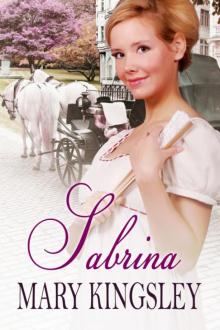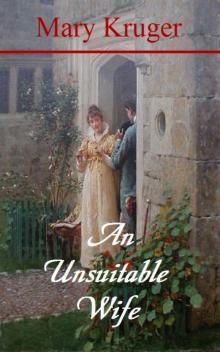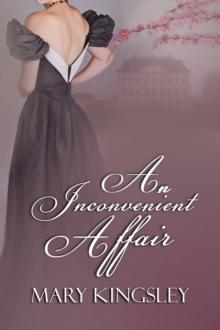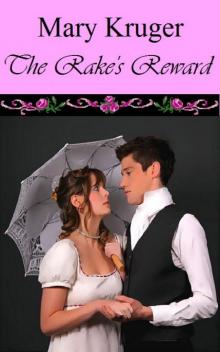- Home
- Kruger, Mary
Rogue's Charade Page 7
Rogue's Charade Read online
Page 7
“Quiet!” There was a strange slashing sound, followed by a thud and a grunt. “I’ll take no excuses from you—where do you think you are going?”
“I’ll not put up with your abuse, and neither will my hounds,” the man called back.
“Damn your eyes, get back here. You’ve been well-paid—”
“You can go to the devil, sir.”
“I’ll see you there first!” the cultured voice yelled, but even to Blythe’s ears his rage sounded impotent. In the distance she could hear men talking, followed by more splashing, as they presumably crossed the brook again. Blythe’s muscles loosened in relief, and then stiffened. Through the fronds of the willow tree on the far bank she could see, first a pair of highly polished boots, dripping with water and mud; the tails of blue coat edged with braid; and then, as the man continued to move, his head. His hair, unpowdered, was clubbed back in a queue; his eyes were narrowed, and his lips were full and red. Blythe involuntarily shrank back against Simon’s chest. It was the man who had watched them yesterday on Westminster Bridge, and now he was staring directly at them.
He had to see them. Blythe, helpless, caught, stared back, seeing eyes that were a peculiar golden color, like a cat’s. Like a cat ready to pounce, and she and Simon were the prey.
“Damn. We’ve lost them.” The man shook one leg, frowned down at his boots, and turned. “They’ll pay,” he said, striding away.
It was a trap, Blythe thought. It had to be. She twisted to look at Simon. He shook his head. Closing her eyes, she let her head drop back against his shoulder, relishing the solid feel of it. She would not have been able to get through this predicament without him. But then, without him, she wouldn’t have been in any danger.
“I think they’re gone,” Simon said very softly after a time, when the sounds of tramping feet and men’s voices raised in argument had ceased, when the noises of the woods had returned to the normal chatter of birds and squirrels and other small animals.
Blythe sagged, feeling her muscles go weak from the release of tension, becoming aware, as if for the first time, of the icy water lapping about her waist. “I’m cold.”
“I’m not surprised, princess.” Simon rubbed his hands up and down on her arms, and then moved, at last. Still, though, she felt his warmth and solid strength at her back, a tactile memory. “Come. We’ll catch our deaths standing here.”
“He really is gone, isn’t he?” she chattered, grasping Simon’s hand and letting him pull her through the willow fronds onto the bank. “I thought, when he stared right at us—”
“We were in shadow.” Simon gestured back at the willow, arching over the stream, and Blythe realized for the first time how effective a hiding place it had been. “He couldn’t see us.”
She glanced up at him. “You don’t sound the least concerned.”
He shrugged. “Why should I? He’s gone. And we, sweeting, are alive,” he said, and, catching her about the waist, swung her around and planted a quick, hard kiss on her lips.
Blythe stood rooted to the spot, hand to her mouth, as Simon, apparently without a care in the world, strode along the bank of the stream. Good heavens, why had he done that? She could still feel the imprint of his lips on hers, still taste him, smell him—and he was walking away, the wretch. Chilled from the water, she shivered, and yet her face felt strangely warm, her limbs strangely weak and restless. Shock, she thought on one level of her mind, and wondered why she hadn’t succumbed to it before.
Simon turned. “Coming?” he called.
“No,” she said, but her paralysis was broken. She walked toward him, wringing her skirt as she went. “I’m going back to London.”
Simon shook his head, his face serious. “You can’t, princess.”
“Of course I can.” She looked up from her task. “Because of the way I look, you mean? The sun will dry me eventually—”
“No, sweeting,” he interrupted, his voice oddly gentle. “Because they’re looking for you now, too.”
She stared at him. “No.”
“Didn’t you hear that man, whoever he is? He was looking for more than one person.”
“Don’t you know who he is?” she exclaimed, diverted for the moment from her own predicament.
“No.” He frowned. “Should I?”
“Simon, he was on Westminster Bridge when we crossed. I thought he paid us particular attention.”
“Bloody hell. Then he’d recognize you. I’m sorry, sweeting.” His fingers brushed her cheek and then dropped, leaving heat behind like a brand. “I never meant to get you into such a mess.”
“Do you mean—are you saying that I’m being hunted, too?”
“I fear so. I’m sorry,” he said again. “But somehow he saw through our masquerade yesterday, and he’d recognize you if he saw you again.” His face was stark, almost bleak. “You’re in danger, Blythe. You can’t go back to London.”
Dazed, Blythe dropped to the ground, her wet skirts puddling about her. “But do you think he knew who I am?”
“If he figured out who we were and where we went, yes. What do you think your employer did yesterday when you didn’t come home?”
“Raised holy hell—I mean, a fuss.” Blythe shook her head. Oh, yes, Mrs. Wicket would have indeed made a fuss, not because of any concerns about Blythe’s safety, but because of the disruption to her own comfort. Within hours the entire neighborhood must have known that Blythe had disappeared, and... “The soldiers will remember me,” she said, dully.
Simon crouched before her. “I fear so, sweeting. You’re a memorable person.”
She gaped at him, and shook her head. “Then what am I to do?”
“I don’t think you have any choice,” he murmured. “You can’t go back to London.”
“Do you mean, just run away? I couldn’t.”
“Why not?” he argued. “What is your alternative, Blythe? Gaol? You’ll not like that, I assure you. And if they think you helped me willingly, what do you think they’ll do to you?”
“I don’t know.”
“Don’t you? Blythe.” He grasped her hands. “There have been women hanged in the past.”
She jerked back. “They wouldn’t!”
“They might. And ‘twould be on my soul.” He gazed at her. “I don’t want that, sweeting.”
“You’re already a murderer.”
He grimaced. “So people say,” he said, and rose. “So. What are you going to do?”
“I don’t know.” She stared hopelessly ahead. “I suppose I could go home.”
“You’ve family?”
“Yes, but I don’t want to go back like this.”
“They’ll look for you there, too.”
Blythe shrugged. “Maybe not.”
“And your family, knowing what you’ve done—will they take you in?”
This time her answer was slower in coming. “Yes. But I’m expected to make my way in the world. If I go home, I’ll just be a burden. ‘Tis a small village. Everyone will know who I am, and what I’ve done.”
“Bloody hell.” Simon stalked a few paces away, staring down into the rushing water. This was all his doing. If he hadn’t grabbed her yesterday, she’d be going on with her life now. Because he had, however, she had no place to go. “You’ll have to come with me.”
“Why?”
He turned. “Because there are people where I’m going who will help you.”
“You know where you’re going, then? I thought—”
“Bloody hell,” he said again, and let out his breath. “Of course I know where I’m going. I wouldn’t have told you, though, if things hadn’t happened as they did.” He grimaced. “I’m sorry.”
“So you keep saying. Not that it changes anything.” She rose at last, and thought her legs appeared shaky, her hands, brushing down her skirts, were brisk. “Shall we be on our way, then?”
“What?”
“We should go. Or would you prefer to wait until the soldiers return?”
He stared at her, this young woman whose life he had disrupted, and who yet stood before him calm, resolute. By God, but she had courage. She was quite a woman. There was not another he knew who would have come through the day’s ordeal as she had. No wonder, then, that he had kissed her.
The memory of that quick, impulsive kiss made him want to squirm. He’d kissed her only because of the sheer joy of being alive, of having survived the present danger. That was all it was, and yet his body remembered, in precise detail, how she had felt pressed against him in the water, her bottom nestled against him, her breasts warm and soft and round just above his arm. By God, ‘twas a good thing the water had been so cold, or he might have disgraced himself. Strange, because she wasn’t his usual type. The women he favored had, like him, too strong a sense of self-preservation to get into such a mess. A mess he had to help her escape.
“All right, then.” He held his hand out to her. She hesitated, surprising him; after the day’s events he felt almost as if he’d been intimate with her. But then she clasped his hand, her own surprisingly strong and calloused, in a friendly grip. A surge of well-being went through him, strange under the circumstances, and yet too powerful to deny. “Let’s be off,” he said, and they set off, to face whatever adventures the road held for them.
Honoria, the Viscountess Stanton, held out a languid hand from the satin chaise longue where she lay, ensconced among pillows of lavender brocade. “Tell me he’s dead, my love,” she purred.
Quentin Heywood stepped farther into the room, glancing toward the dressing room. His coat of emerald brocade struck a blaze of color against the pastel femininity of the room. “Is your maid not here?”
“Clothilde? Bah. She’s a foolish one, and she speaks little English. You’ve little to fear, my love. Come, tell me everything. I was surprised you weren’t here last evening.”
“I had, er, rather pressing business to attend to.” Quentin ambled across the room to look out a window, seeing through the wavy glass a garden, blooming with flowers in all shades of purple, from a lilac so pale it was nearly white, to a midnight-dark violet. Surrounding the garden were high brick walls, making it an exquisite oasis in the midst of the city. Since the viscount was quite serious about tending to his estate, he was often away from his wife, who preferred London. That perquisite had been left to Quentin, and a dangerous one it was. If the viscount ever learned exactly what his wife was up to, there would be trouble. Not for Honoria, of course; she’d manage to slip out of it somehow. Quentin wouldn’t be so lucky. If the truth got out, it would be his neck stretching at the end of a hangman’s noose.
“Tell me.” Honoria’s voice held a tiny note of impatience, though its huskiness hadn’t abated. “Did the actor die at peace with his God, pleading his innocence? Oh, I know no one would believe him,” she went on, as Quentin turned from the window. “But did he dance at the end of the rope as I’ve heard they do?”
“My God!” Quentin burst out. “You sound as if you’re enjoying this.”
“But I am, my sweet, I am. Two enemies disposed of, and so neatly, too.”
“One.”
It appeared to take a moment for that to penetrate. Honoria turned her head, her pale blue eyes blinking. “I don’t think I understand you.”
“The actor escaped.”
She didn’t react as he’d expected. He’d expected temper, shouting, perhaps physical violence. Instead, she lounged back, her face the inscrutable mask that served her so well at card tables and gambling hells. “I know.”
He turned his head, sharply. “How?”
“Really, Quentin, think you so little of me? I had the news yesterday. How could you have let him escape?”
Quentin leaned back in the window embrasure, smiling a little, knowing his apparent lack of temper would only infuriate her further. Good. So far he had been the only one in any danger in this escapade. Let her suffer for a while. “It wasn’t exactly by choice, my love.” From his pocket he produced a knife and began paring his nails, staring at them intently. “Apparently he had some help. The priest who was to attend his last moments has also disappeared.”
Honoria was out of bed, stomping about the room, her wrapper of lavender silk floating about her. “What of the soldiers?”
“Caught up with him and then lost him.”
“Oh?” She halted in front of him. “And what,” she said, jabbing the tip of her finger into his chest, “of you?”
“God, you’re magnificent when you’re angry,” he said, and caught her to him for a long, ravaging kiss. Her hands clawed at his neck, but then, they often did. He bore the scars of their lovemaking proudly.
She tossed her head when he released her. “You cannot get around me so easily,” she said, but her cheeks were flushed, her eyes bright. “Do you mean to tell me you did nothing?”
“Of course not.” He leaned back again, crossing his arms over his chest. His not touching her would anger her all the more. It was rare that he had the upper hand with her. He rather enjoyed it. “Woodley left London with a woman. I don’t know who she is yet, possibly one of the other players. They crossed Westminster Bridge—I saw them myself, though I didn’t realize it—and headed east. After much searching, I ascertained that they had camped in a field near to Shooter’s Hill, and today I hired hounds and men to go after them.”
“And?”
This was the part he dreaded telling. “They escaped.”
Once again Honoria surprised him, looking up at him with narrowed eyes. “That rather puts a crimp on things,” she said, mildly.
“I’m confident I can find them again—”
“Are you?” Her voice flicked out like a lash, and Quentin’s unease grew. Honoria enraged was entertaining. Quiet and sharp, though, she was dangerous. “I sometimes wonder what use you are to me, Quentin.”
He bent his gaze upon her. “You know quite well.”
“What, that?” Her hand flicked sharply toward his private parts, making him flinch, and she gave a little laugh. “Any man can give me that, Quentin, so do not delude yourself as to your value to me.”
“Except that I know what really happened in Canterbury,” he said, quietly.
“And so do I!” She whirled around, her wrapper swirling, her mass of raven dark hair caressing her cheeks, her shoulders. She had the face and voice of an angel, and the morals of a strumpet. “So do I.” Her voice lowered. “So do not think to threaten me with that, Quentin. All I need to is go to the magistrate and lay information against you—”
“And implicate yourself?” His smile was slow, lazy, hiding his icy trickle of panic. “I don’t think so, my sweet.”
“Ah, but I was here, Quentin.” She tossed her head again. “And so was the viscount. Who will believe you?”
Quentin glanced out the window, arms still crossed on chest, thinking, thinking. It was Honoria who had planned this venture; Honoria, who had reason to set the train of events into action. It was he, however, who had taken all the risks, he who had arranged for things to happen as they had, he who had bribed gaolers and guards and magistrates alike. He whose face would be remembered. He who would suffer the consequences. Unless he used his one lever against her.
He glanced at her quickly, to see her regarding him with mockery and triumph. Almost he blurted out what he knew, the evidence that would damn her most completely, and then bit his tongue. Later. Such precious information should not be squandered. “Then it seems, my sweet, that we need each other. I, because of what you can do to me, and you because of what I can do for you.”
Honoria’s eyes narrowed to slits. “What you have done for me so far is to let the actor slip free.”
“But not for long, my love. Not for long. I’ll find him.” Uncoiling his arms, he straightened and began, slowly, to stalk her. “And when I do, I’ll take care of him for you. That, I promise.”
“You have not done overwell to date, Quentin.”
“No?” He stopped before her, and his hand rested
lightly on her throat, fingers and thumb caressing the soft skin. “But who else can you turn to, my sweet? Who else can you trust not to tell your secrets? You need me,” he went on, as alarm flickered in her eyes. “We are in this together, my love.”
“Do not fail me next time, Quentin,” she murmured, reaching her arms around his neck. “I want the actor dead.”
“He will be caught and hanged, I promise you.”
Honoria tipped her head back, laughing huskily. “I love it when you talk to me like that,” she said, and, pressing her breasts against him, pulled his head down for a long, hard kiss. Satisfactory, thought Quentin, sweeping her into his arms, carrying her across the room and dumping her onto the feather mattress. There she lay, legs sprawled, eyes bright, as he pulled at the buttons of his breeches. The viscountess was his again. And only he knew the true power he held over her. Satisfactory, indeed.
Chapter Six
Night was drawing on. Blythe trudged along beside Simon, no longer quite aware of her surroundings, no longer sure of what she was doing. Had someone told her two days ago that she would be traveling with an actor turned fugitive, she would have laughed in disbelief. She was doomed to a dull life, always at someone’s beck and call, while other people had adventures she could only read about. Now everything had changed. Adventure, however, was proving to be a lot less comfortable than she had expected.
“We’ll stop soon,” Simon said, the first words either had spoken in some time. It had been a long, weary day, spent tramping along the verge of the road, seeing only occasional glimpses of a fine house on a hill, its towers rising high into the sky; or of the Thames, not far distant. Any sign of pursuit sent them diving into the nearby woods, leaving them bruised and scratched. Because of Blythe’s knowledge of plants and Simon’s skill in slipping into other people’s gardens and barns, they had not gone hungry. Neither, though, had they had a satisfying meal. Now they faced another night sleeping in the rough. She was mad to have done this, mad to have come along. It would have been far better to return to London and face the consequences. Too late now.

 Sabrina
Sabrina Rogue's Charade
Rogue's Charade Unsuitable Wife
Unsuitable Wife In a Pirate's Arms
In a Pirate's Arms Crystal Heart
Crystal Heart Inconvenient Affair
Inconvenient Affair Summer Folly
Summer Folly Rake's Reward
Rake's Reward Gifts of the Heart
Gifts of the Heart